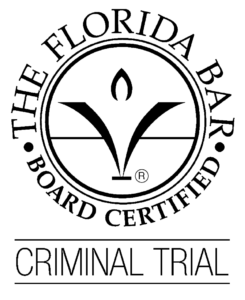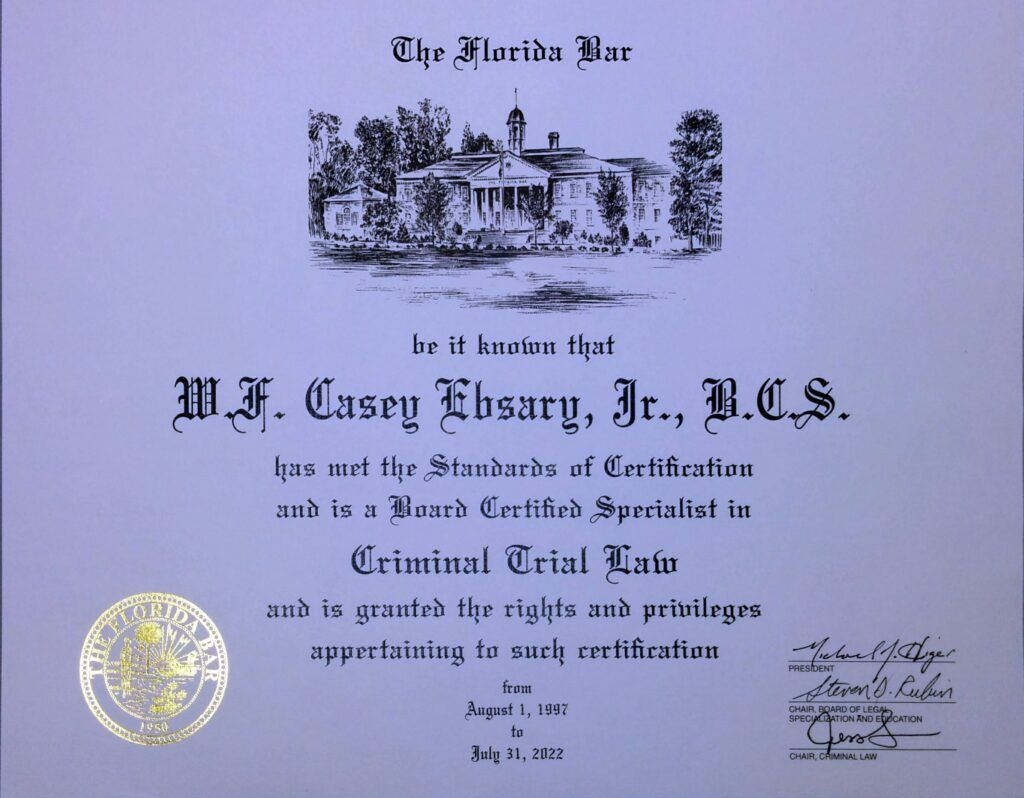The Significance of Board Certified Criminal Trial Lawyers in Tampa, Florida
Introduction
Criminal defense attorneys play a pivotal role in the American justice system and in Tampa, Florida. They are tasked with the challenging responsibility of representing individuals and organizations accused of criminal offenses, ranging from minor traffic violations to grave felonies like murder and embezzlement. The core duty of a criminal defense attorney is to safeguard the rights and interests of their clients and ensure that they receive a fair and just trial. In Florida, board certification is a prestigious acknowledgment of an attorney’s expertise and experience in a specific legal domain, and it is administered by the Florida Bar Board of Legal Specialization and Education. This certification holds immense importance because it signifies that an attorney has met stringent state-set standards and successfully passed a rigorous examination within their field of practice. When faced with criminal charges, it is paramount to seek out a board-certified criminal defense attorney who possesses the requisite knowledge, experience, and a proven track record of success. This article delves into the significance of board-certified criminal trial lawyers in Florida, emphasizing the importance of thorough research and interviews when selecting legal representation.
I. Understanding Criminal Defense Attorneys
A. Role and Responsibilities
Criminal defense attorneys are advocates for individuals and entities accused of criminal offenses. Their duties encompass:
- Legal Counsel: Providing legal advice and guidance to clients throughout the legal process.
- Investigation: Conducting thorough investigations to gather evidence, interview witnesses, and build a robust defense strategy.
- Court Representation: Representing clients in court proceedings, including trials, hearings, and negotiations with prosecutors.
- Protecting Rights: Ensuring that clients’ constitutional rights are upheld during the legal process.
- Negotiation: Negotiating plea deals or settlements when it is in the client’s best interest.
- Advocacy: Zealously advocating for the client’s innocence or for the most favorable outcome.
B. Range of Criminal Offenses
Criminal defense attorneys handle an extensive array of criminal offenses, which may include:
- Misdemeanors: Lesser offenses such as petty theft or simple assault.
- Felonies: More serious crimes, including murder, rape, and embezzlement.
- White-Collar Crimes: Financial and corporate offenses like fraud, insider trading, and money laundering.
- Traffic Violations: Offenses like DUI (Driving Under the Influence) and reckless driving.
II. The Significance of Board Certification
Board certification serves as a testament to an attorney’s dedication to excellence in their legal practice. In Florida, the process of becoming board certified in criminal defense law is rigorous and serves as a benchmark for legal expertise.
A. Florida Bar Board of Legal Specialization and Education
The Florida Bar Board of Legal Specialization and Education oversees the process of board certification for attorneys in the state. This body ensures that attorneys meet high standards of competence and professionalism within their chosen specialty.
B. Stringent Requirements
To become board certified in criminal defense law in Florida, attorneys must fulfill stringent requirements, including:
- Minimum Years of Practice: Typically, attorneys must have a minimum of five years of legal practice.
- Substantial Involvement: Demonstration of substantial involvement in criminal defense cases.
- Peer Review: Attorneys undergo peer review by their colleagues and judges to assess their competence, ethics, and professionalism.
- Continuing Legal Education: Completion of continuing legal education credits in the field of criminal defense law.
- Passing the Examination: Successfully passing a comprehensive written examination in criminal defense law.
C. Expertise and Knowledge
Board certification signifies that an attorney possesses a high level of expertise and knowledge in criminal defense law. Clients benefit from this expertise as it ensures that their attorney is well-versed in the intricacies of criminal law, court procedures, and case strategy.
III. The Importance of Board Certification for Clients
Clients seeking legal representation in criminal matters stand to gain significantly from choosing a board-certified criminal defense attorney.
A. Tailored Expertise
Board-certified attorneys are well-equipped to handle a wide range of criminal cases, from minor infractions to severe felonies. Their specialized knowledge allows them to craft tailored defense strategies that address the specific nuances of each case.
B. Legal Competence
Board certification assures clients of the attorney’s competence and commitment to the highest standards of legal practice. It serves as a reliable indicator of an attorney’s ability to navigate the complexities of the criminal justice system effectively.
C. Protection of Rights
Criminal defense attorneys, especially board-certified ones, are dedicated to safeguarding their clients’ rights throughout the legal process. This includes protecting against unlawful searches and seizures, ensuring the right to remain silent, and advocating for a fair trial.
D. Negotiation Skills
Board-certified attorneys possess refined negotiation skills, allowing them to engage in meaningful discussions with prosecutors to secure the best possible outcomes for their clients. Whether it involves plea bargains or reduced charges, their expertise is invaluable.
IV. The Selection Process
Selecting the right criminal defense attorney is a critical decision for individuals facing criminal charges. Here are essential steps to consider:
A. Research
Conduct thorough research to identify board-certified criminal defense attorneys in Florida. Utilize online resources, legal directories, and recommendations from trusted sources.
B. Interviews
Schedule consultations or interviews with prospective attorneys. This is an opportunity to assess their qualifications, experience, and compatibility with your case.
C. Assess Reputation
Evaluate an attorney’s reputation within the legal community. Peer recognition and client testimonials can provide valuable insights.
D. Track Record
Review the attorney’s track record of success in handling cases similar to yours. A strong history of favorable outcomes is a positive indicator.
E. Legal Fees
Discuss legal fees and payment arrangements upfront to avoid any misunderstandings later in the legal process.
F. Comfort and Trust
Choose an attorney with whom you feel comfortable and can trust. Effective communication and a strong attorney-client relationship are essential.
V. Conclusion
In summary, the role of criminal defense attorneys in protecting the rights and interests of individuals and organizations facing criminal charges cannot be understated. When seeking representation, it is imperative to consider board-certified criminal defense attorneys in Florida due to their specialized knowledge, expertise, and dedication to upholding the highest standards of legal practice. Board certification serves as a symbol of an attorney’s commitment to excellence, and clients benefit from their tailored expertise, legal competence, protection of rights, and negotiation skills. To make an informed decision, it is essential to conduct thorough research, interview potential attorneys, assess their reputation and track record, and establish a comfortable and trusting attorney-client relationship. In doing so, individuals facing criminal charges can secure the best possible legal representation and increase their chances of a fair and just outcome in the criminal justice system.

